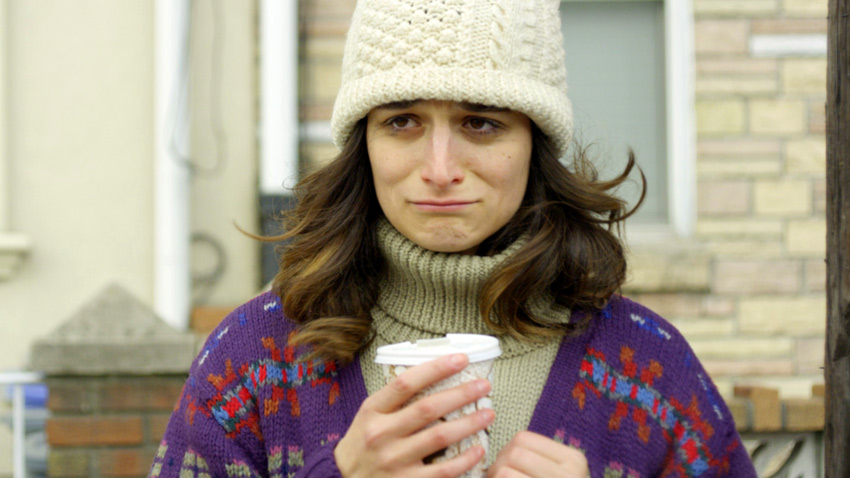
Premiering at Sundance, “Obvious Child” is about would-be stand-up Donna Stern (Jenny Slate) and her decisions when a one-night stand results in an ill-timed unwanted pregnancy. “Obvious Child” began as a short in 20009, then hunted for crowdfunding, got it, and resulted in this feature-length Sundance 2014 debut for writer-director Gillian Robespierre. It’d be easy to make a crass joke about how, for a film about abortion, “Obvious Child” has had an unexpectedly long gestation period. That’s also about the only crass joke “Obvious Child” doesn’t make, but it’s also worth noting that despite its fearlessness and fake-tough bravado, the film never takes its circumstances or consequences lightly; Slate’s Donna Stern is cracking wise because if she didn’t, she’d probably just crack.

Please note for but one example that even as Judd Apatow’s “Knocked Up” was praised for its realism about pregnancy, it only brought up abortion once—as a joke, as in “Rhymes with ‘Schma-smortion.” Slate’s Donna is grotesquely unprepared for adult life: she’s about to lose her job at a “Non-Imperialsist” used book store, her boyfriend just dumped her for making jokes about their relationship in her act, her mom and dad wonder when she’ll get her life together, and there’s a very real sense that the title refers to her clearly evident lack of maturity. Donna’s obviously a child, obliviously so, and the realization that a one-night stand with nice-guy Max (Jake Lacy) has left her pregnant sends her, swiftly, to Planned Parenthood so she can deal with her unplanned parenthood.
But breaking taboos is easy; the question is what you make out of the pieces you’re left with. There’s none of the expected movie-of-the-week scenes here—Slate never has an actorly monologue about her predicament, just a series of laugh-so-you-don’t-cry wisecracks; when she goes to the clinic, she’s never confronted by shrieking anti-abortion activists. And yet when Donna is laying sedated on an operating table and gravity sends her tears down her cheeks towards the clinical cold tile floor, you can recognize that her decision may be decisive, but it isn’t unfelt. Jake Lacy’s Max is an entirely decent human—made up of relaxed charm and understandable reactions—and there are nice supporting moments from Gaby Hoffmann as her best friend, Richard Kind as Donna’s dad, Polly Draper as her mom and David Cross, in a role he was born for, as a self-loathing, self-loving stand-up.
 We spend the majority of our time with Slate, though, and it’s worth observing that Donna is not nearly as good a stand-up and comedic performer as Slate herself, a nice and deft bit of acting. “Obvious Child” is more of a showcase for Robespierre as a writer than it is a crafty, clever demonstration of her technical skills; the film’s more about dead-on relatable moments than it is about tricky, tilted camera angles. The film was made in 16 days, and yet it never feels rushed or slapdash, in no small part because it doesn’t depict too much more than a month of life for its characters. Goodhearted and perhaps a little glib, “Obvious Child” gets a few points for true-life circumstances and poison-black humor, but I still found myself wanting a little more from it, some moment of external action to counter Donna’s internalized decision-making process. “Obvious Child” is tough and funny and true and snappy, but I still found myself thinking about how the film would be a lot less funny if Donna were a waitress on her own in Nebraska as opposed to the Williamsburg-dwelling only child of well-to-do Manhattanite parents. “Obvious Child” is well-made and wickedly bold, but I still found myself wishing for a little more subtle maturity on the part of its characters and creators. [B-]
We spend the majority of our time with Slate, though, and it’s worth observing that Donna is not nearly as good a stand-up and comedic performer as Slate herself, a nice and deft bit of acting. “Obvious Child” is more of a showcase for Robespierre as a writer than it is a crafty, clever demonstration of her technical skills; the film’s more about dead-on relatable moments than it is about tricky, tilted camera angles. The film was made in 16 days, and yet it never feels rushed or slapdash, in no small part because it doesn’t depict too much more than a month of life for its characters. Goodhearted and perhaps a little glib, “Obvious Child” gets a few points for true-life circumstances and poison-black humor, but I still found myself wanting a little more from it, some moment of external action to counter Donna’s internalized decision-making process. “Obvious Child” is tough and funny and true and snappy, but I still found myself thinking about how the film would be a lot less funny if Donna were a waitress on her own in Nebraska as opposed to the Williamsburg-dwelling only child of well-to-do Manhattanite parents. “Obvious Child” is well-made and wickedly bold, but I still found myself wishing for a little more subtle maturity on the part of its characters and creators. [B-]

